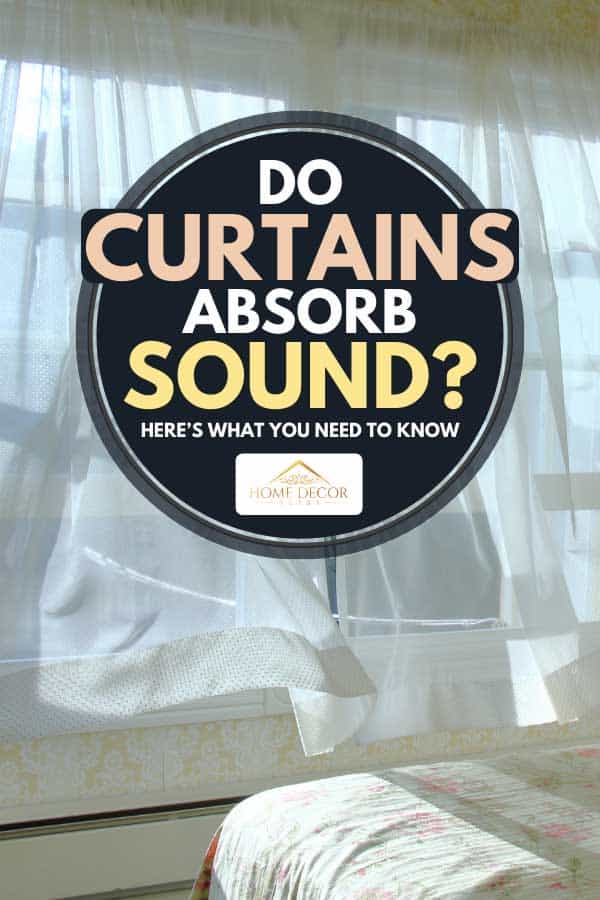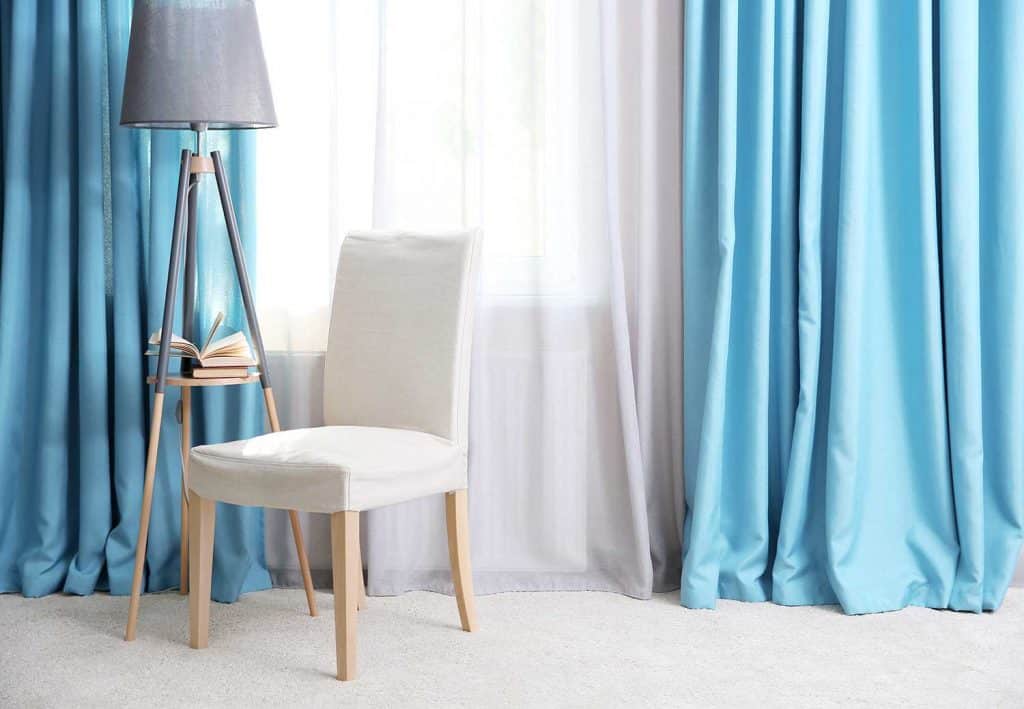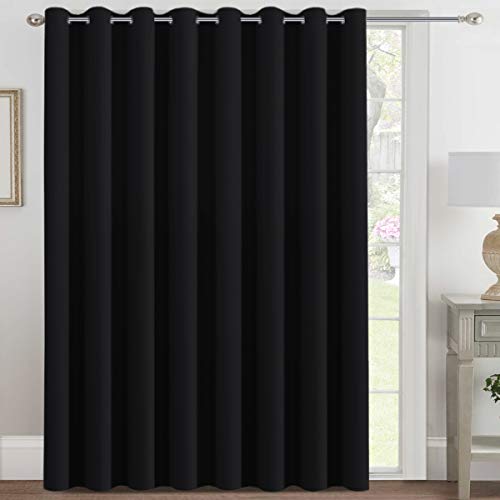There's little less enjoyable than attempting to partake in a quiet evening at home and being bombarded with the sounds of passing cars, music blaring from another home, or kids playing loudly in neighboring yards. Whether you live near a major road or are trying to work from home while residing in a bustling neighborhood, these outside noises can be a nuisance and a distraction. So, you may be wondering, could curtains help to dampen the outside noise?
The simple answer is yes, curtains can absorb sound from coming into your home, or even control the sound within a room to reduce echoes and reverberation. However, not all curtains will work towards absorbing sound, so there are factors to consider in order to get the best results:
- Sound absorbing vs soundproofing
- Material
- Density
- Coverage
Having a quiet home can increase productivity and create a tranquil environment for you and your family. However, determining what are the best curtains for your home can be an overwhelming task. But don't worry, we've researched for you, and have even found some great products for you to try. Just keep reading!

Curtains as Sound Barriers: Factors Worth Considering
Sound Absorbing Vs Soundproofing
It's important to understand the difference between sound absorption and soundproofing when looking to control the noise coming into your home. Sound-absorbing materials are going to absorb sound but still allow for some to pass through. The noise that can pass through will be quieted. These materials are not going to completely eliminate sound coming into a room.
Soundproofing, on the other hand, blocks the sound from passing through by reflecting it off the material, and whatever may enter is absorbed before reaching the other side. The reason it's important to understand the difference is that many curtains will label themselves as "soundproof" when in fact they only deaden the sound.
Although curtains will dampen and absorb sound, blocking sound out completely is a bit more complicated. We will be discussing some affordable options later.
Material
Material plays a large role in how effectively curtains will absorb the sound coming into your home. Thin, solid, or vinyl materials will do little in the way of protecting you from pesky outside noise. When selecting curtains, porous materials are going to be your best option.
Much like a sponge absorbing water, you want your curtains to absorb the sound. So as a simple rule of thumb, if your material can absorb water, it's able to somewhat absorb sound waves coming into the room.
What Fabric Absorbs Sound?
Wools, velvets, and velours are great places to start when it comes to sound absorption. Anything with polyester fibers or even cotton and linen will also act as a sound absorber. Still, the fabric isn't the only factor to consider when wanting to reduce the noise coming into your home. And fabric alone can only do so much.
What Are Acoustic Curtains Made Of?
Acoustic curtains were created for the absorption of sound, both from inside the home and outside. If you have an echoey room that reverberates sound easily, these are a great option.
These curtains are made from a thick, porous material, typically wool, that is covered in an insulating liner. This liner is the same material on the back of blackout curtains that keep light and heat out of your room. Acoustic curtains are not only capable of deadening sound, they are also helpful in regulating the temperature of the room and blocking out light.
Density
Apart from a porous fabric, the density of the curtains will help to reduce sound. The thicker the curtain, the more pores in the material that will be able to trap sound waves. When looking for density, you can look at the weight of the curtain. 1.5-2 pounds is the minimum density you want for the best sound absorption.
One way to make your curtains denser is by using pleating. To do this, you can get curtains that are larger than your windows, or you can use four curtain panels where you would typically use only two. You want your curtains to bunch up and create more layers for sound waves to have to pass through.
Coverage
We sometimes add affiliate links and content that was curated and created by our team with the help of advanced ai tools to help showcase the best design styles.

When determining what size curtains to get for your home, covering as much space as possible around the window is going to get you the best results at absorbing sound. The minimum coverage would be three inches in all directions. So, your curtains should hang three inches higher, longer, and wider on both sides of your window.
For maximum results, drapes that span from the ceiling to floor will prevent the most air movement around the curtains, which means less sound coming through. You should also make sure your pleats extend past the sides of the window to help create a seal.
If you plan to have your curtains open when you aren't concerned about sound or light, you can add curtain tieback hooks to the walls. This will not only allow you to easily keep your curtains open but also can be used to hold the outer sides of the drapes closer to the wall when they're closed. Again, this creates that seal to prevent air and sound movement around the curtains.
What Are The Best Sound Blocking Curtains?
We've discussed the necessary factors to having the most effective sound-absorbing curtains, so now it's time to see some great products you can use to dampen outside noise from entering your home. Below you will find a list of the best sound reducing curtains, a great place to start when looking to reduce noise pollution.
Give your home some peace and quiet with the following:
H.Versailtex Blackout Curtains
H.Versailtex's drapes hit the mark in both material, density, and the ability to be full coverage. These are made of three layers, including a woven thermal layer in the middle. These curtains are also dense, weighing at just over four pounds per panel. And they are large enough to easily follow the three-inch rule we discussed earlier. Plus, they are blackout curtains and their thermal layer can help to regulate the room temperature.
Click here to view them on Amazon.
Nicetown Thermal Total Blackout Curtains
These curtains are made with two layers of triple woven blackout fabric. They weigh about 3.6 pounds per panel and are large enough as a pair to cover most regular-sized windows. They put the "total" in "total blackout" and also help to regulate noise and temperature.
Click here to view them on Amazon.
RYB Home Room Divider Curtain
Yes, these room divider curtains don't just divide rooms. They can also be used as light and noise blocking curtains for your windows. These curtains are certainly heavy, weighing 4.3 pounds per panel. They are also made with triple woven polyester material, making them a good choice for sound absorption. They come in panels that are 15 x 9 feet, meaning they can cover larger windows and even glass doors.
Click here to view it on Amazon.
What Are The Best Blinds For Sound Blocking?
Curtains aren't the only things that can help reduce noise in a room. Check out these excellent blinds options:
Grandekor Cordless Cellar Shades
When looking for blinds that can block sound, imitating the porous materials in curtains will help to get you the best results. These blinds do this by having a honeycomb pattern on the inside. When the blinds are pulled down, the double layers create openings that absorb and trap sound, light, and heat.
Click here to view them on Amazon.
Chicology Cordless Cellar Blackout Shades
These blinds have all of the great attributes as the Grandekor brand, but with more options to customize. They feature the honeycomb pattern to trap sound waves and air and are made slightly smaller than the window in order to fit inside the frame. This creates the seal around all edges to prevent air movement. These shades also come in light filtering and blackout, so you can choose your level of coverage, and custom sizing so you know all your windows can be covered.
Click here to view them on Amazon.
Achim Home Pleated Window Shade
As with curtains, pleating creates density in blinds, even when they seem thin. The pleats in these shades will trap in airflow and reduce intruding sounds. Pleated shades are a more affordable option when looking for noise reduction.
Click here to view them on Amazon.
How To Soundproof Your Windows Affordably
We've discussed options on sound dampening curtains and blinds, but what if you are wanting to soundproof your windows and not break the bank? You have a few options on how to affordably achieve a quiet home.
Acoustic Caulk
Some of your sound problems may be the results of holes or gaps between your window and its frame. To fix this, you can remove the sealant that's around the window and reseal it with latex-based acoustic caulk. This sealant's function is to block airflow and reduce noise.
Even if you plan to do more extensive soundproofing on your windows, this sealant is an excellent place to start your project. It can be found on Amazon for a great price.
Click here to view it on Amazon.
Window Plug
Building a window plug is an affordable DIY project to completely soundproof a window, all for about fifty dollars. Window plugs are a temporary fix and can be easily removed as needed.
A window plug is made of soundproof foam, a soundproof mat, and a wooden board. After measuring the window and cutting the materials to fit the dimensions, you attach the foam to the mat, and then the mat to the wooden board. The foam end is placed inside the window frame and you can attach handles to the wooden side for easy placement and removal from your window.
Make sure when measuring your window, you measure slightly larger than the window inside of the frame so you can ensure the window plug is a tight fit.
Combine Curtains And Blinds
The simplest solution to creating more soundproof windows would be to combine the sound blocking blinds with the sound blocking curtains. This will create extra layers for sound to travel through, as well as more pores for sound to get trapped in.
In Closing
Whether you live on a busy street or just want to eliminate the potential of outside distractions, sound-absorbing curtains and blinds are an effective solution to outside noise.
To read more about utilizing curtains in your home, check out these posts:







